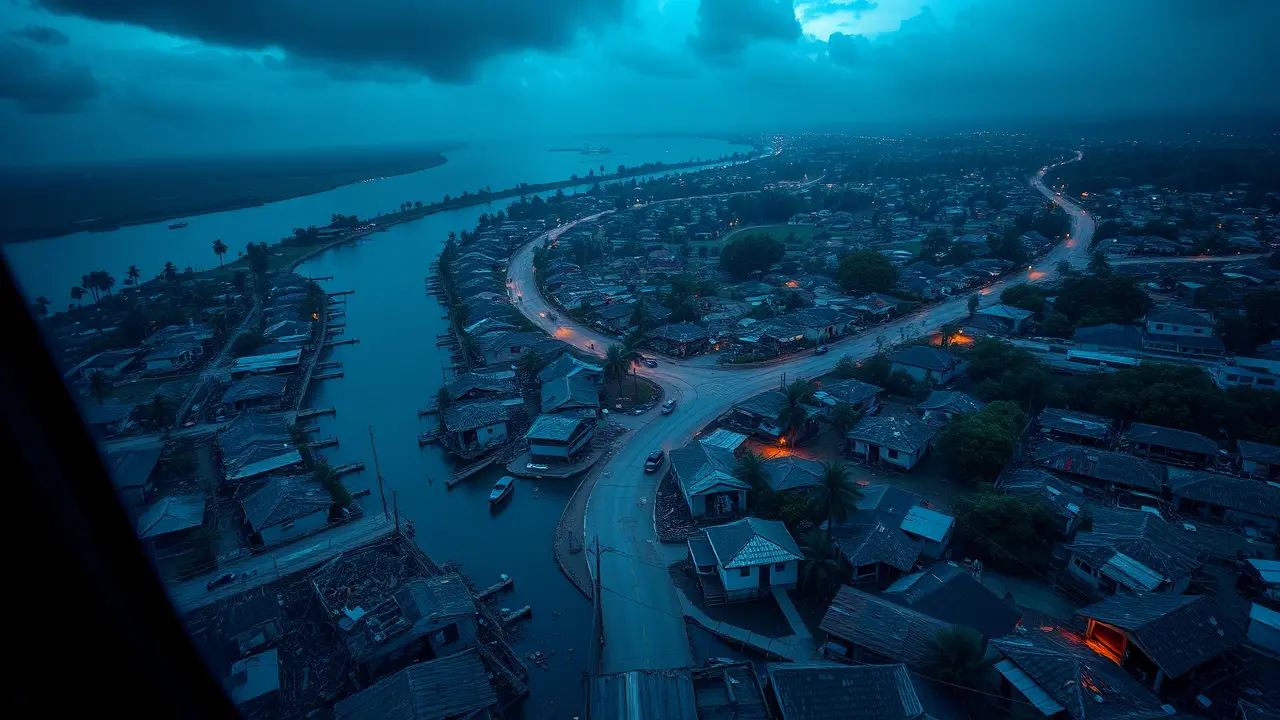
Otheraccidents & disastersSearch and Rescue
Aerial View Shows Hurricane Melissa's Ground Zero Destruction.
EM
Emma Wilson
19 hours ago7 min read
From the shuddering belly of the aid helicopter, the island unfolded not as a paradise but as a wound, a raw, sprawling testament to Hurricane Melissa’s indiscriminate fury. The BBC’s Will Grant, his gaze fixed on the landscape below, witnessed a scene of such profound devastation in the town of Black River that it seemed to suck the very air from the cabin.This was ground zero, a place where the storm’s abstract category on a meteorologist’s chart became terrifyingly concrete. Where there should have been a vibrant coastal community, there was now a sprawling junkyard of splintered dreams.Roofs were peeled back like tin cans, revealing the intimate, now-violated spaces of living rooms and kitchens. The skeletal remains of houses stood naked, their walls scoured away by the wind’s sandblasting effect, leaving behind only the ghostly outlines of foundations.The iconic river itself, from which the town drew its name and life, had become a monstrous, brown torrent, overflowing its banks and swallowing entire neighborhoods in a churning soup of mud, debris, and shattered possessions. Cars were tossed into grotesque sculptures of metal, boats were flung inland and deposited atop buildings like discarded toys, and the lush greenery that once defined the tropics was stripped bare, leaving a landscape of broken, denuded trees pointing accusingly at a sky that had only just cleared.This aerial view, so clinical and comprehensive, laid bare the systemic collapse. There were no people visible from this altitude, just the overwhelming evidence of their sudden, brutal displacement.The critical infrastructure—power lines, communication towers, water treatment facilities—was simply gone, erased from the map. The single road connecting Black River to the rest of the island was severed in multiple places, buried under landslides or washed away by storm surge, isolating the survivors in a fight for their lives without power, clean water, or a clear route for aid to reach them.The history of the Caribbean is, in many ways, a history written by hurricanes, from the Great Hurricane of 1780 that killed an estimated 22,000 people to the more recent, chilling memories of Maria and Dorian. Each event follows a grimly familiar pattern: the frantic preparations, the terrifying hours of the storm’s passage, and then the long, agonizing aftermath where the world’s attention flickers and fades long before the last piece of rubble is cleared.The initial response is always a race against time, a desperate scramble by organizations like the Red Cross and local militaries to airlift in emergency food, medical supplies, and water purification tablets to stave off a secondary crisis of disease and dehydration. Yet, the true challenge, as climate scientists and disaster recovery experts grimly note, begins weeks and months later, when the television cameras have left and the monumental task of rebuilding a society from scratch must begin.For the residents of Black River, the psychological trauma will be as enduring as the physical destruction. The sound of the wind will now be a trigger, the forecast of a tropical depression a source of paralyzing anxiety.The economic impact will be catastrophic, wiping out livelihoods tied to fishing and tourism for years to come. The stark inequality of climate change is on full display here; communities like this, which have contributed least to the global carbon emissions driving the intensification of these storms, are now bearing the brunt of their apocalyptic force.As our helicopter banked away, leaving the devastation of Black River shrinking in the distance, the question hanging in the air was not just about the immediate relief effort, but about the future. Will this reconstruction be a mere replication of the vulnerabilities that led to such catastrophic damage, or will it be an opportunity to build back smarter, with stronger building codes, managed retreat from the most vulnerable coastlines, and a renewed global commitment to the climate action that is so desperately needed to prevent the next Melissa from being even worse? The view from the sky offered no easy answers, only a silent, sobering plea from the broken ground below.
#featured
#hurricane melissa
#black river
#aerial view
#devastation
#aid helicopter
#destruction
#aftermath
Stay Informed. Act Smarter.
Get weekly highlights, major headlines, and expert insights — then put your knowledge to work in our live prediction markets.
© 2025 Outpoll Service LTD. All rights reserved.